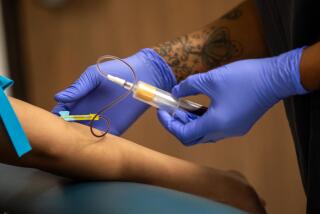Transfusions May Be Basis for AIDS Tests : U.S. Expected to Urge Those Given Blood in 1977-85 to Be Checked
- Share via
WASHINGTON — The Public Health Service is expected to recommend soon that many individuals who received blood transfusions between 1977 and 1985 voluntarily undergo the AIDS antibody test, but federal health officials are still wrestling with how sweeping the proposal should be, The Times has learned.
“We don’t want to panic people,” one federal health official said, emphasizing that the risk of infection with the AIDS virus would differ substantially between an individual who received a single transfusion in a region of the country where infection is low, and someone given multiple transfusions in an area with a high prevalence of infection, such as New York City, San Francisco and Los Angeles.
Sexual Activity a Factor
“There are many things that have to be considered, such as the age of the individuals, and whether they are sexually active and likely to pass the infection on to others,” he added. “Our concern has always been primarily those who have to know (if they are infected).”
Of the nearly 32,000 cases of AIDS reported in the six years of the epidemic, 657 cases, or about 2%, have occurred among recipients of blood transfusions. Since 1985, when a test was introduced to screen all donated blood, the danger of contracting AIDS through a transfusion has been considered slight.
Public Health Service sources said they hope to alert the medical community to the possibility that there are some transfusion recipients who should be encouraged to have the procedure, which determines whether an individual has been exposed to the AIDS virus, not whether he or she will contract the deadly disease. A person who tests positive is presumed to be infected and infectious to others.
“We’re trying to come out with something that says: ‘This is a problem that physicians ought to be aware of, and a judgment has to be called for,’ ” said the public health official, who requested anonymity. “We are trying to be reassuring, but we are saying there is a responsibility that physicians will have to take.”
AMA’s Concern
However, officials at the American Medical Assn., who estimate that there have been 34 million transfusions during the eight-year period, said Sunday that they are concerned that most physicians are still not equipped to deliver the comprehensive counseling considered a crucial element of any screening program.
“The test alone is not a satisfactory way to deal with this problem,” said William Hendee, the AMA’s vice president for science and technology and a member of its AIDS task force. “You also have to provide significant amounts of counseling to individuals, and we are concerned we will not be able to respond to this large a number of individuals.”
In March, 1986, the Public Health Service recommended that voluntary use of the test be expanded to members of high-risk groups, primarily homosexual and bisexual men, intravenous drug users and their sexual partners, who compose nearly 90% of the cases in this country.
Gays Urged Counseling
Since 1985, when the test first became available, gay and civil rights groups and others have urged that comprehensive and sensitive counseling accompany all testing.
“It’s nice to know that after several years of experience with the blood test that the Public Health Service and the medical Establishment have learned of the sensitivity of widespread testing of people who are considered at risk,” said Jeff Levi, executive director of the National Gay and Lesbian Task Force. “It would have been nice if that sensitivity had been displayed when the recommendations for gay men to be tested were similarly introduced.”
Rep. Henry A. Waxman (D-Los Angeles), chairman of the House Energy and Commerce subcommittee on health, said: “This call for a segment of the general population to be tested will emphasize to everyone the need for counseling and confidentiality of records to make public health programs work.”
Waxman added: “Without counseling, testing is ineffective in disease control. Without confidentiality, no one will come in for the testing.”
Educating Physicians
The AMA’s Hendee said that organization is “working very hard” to educate physicians “to be able to provide support services to go along with the screening--but it takes time.”
Further, Hendee added: “We are concerned this might cause a large amount of anxiety for a large number of people that we aren’t quite ready to handle.”
Hendee said the AMA has suggested that federal health officials consider “something less than a blanket set of recommendations,” that is, that they not propose that everyone who received transfusions between 1977 and 1985 seek to be tested.
“We would ask that they consider the magnitude of risk, and segment out those who may be at higher risk, based on the site of transfusion and the number of transfusions,” Hendee said.
Voluntary Testing Sought
Otherwise, Hendee said: “Everyone now will have to think: Am I one of those people? Has someone with whom I’ve had sex had a transfusion? A lot of people will have to wonder about that. We have to be careful we don’t exacerbate that sense of anxiety.”
Federal health officials, who sponsored a public forum last month in Atlanta to discuss how the test could best be used to control the epidemic, are expected to issue recommendations stemming from that meeting within several weeks. At the time, participants rejected mandatory testing and called for expanded voluntary testing programs.
AIDS, or acquired immune deficiency syndrome, destroys the body’s immune system, leaving it powerless against certain cancers and otherwise rare infections. It can also invade the central nervous system, causing severe neurological disorders. It is transmitted through anal and vaginal sexual intercourse, through the sharing of unsterilized hypodermic needles and by woman to fetus during pregnancy.
More to Read
Sign up for Essential California
The most important California stories and recommendations in your inbox every morning.
You may occasionally receive promotional content from the Los Angeles Times.












